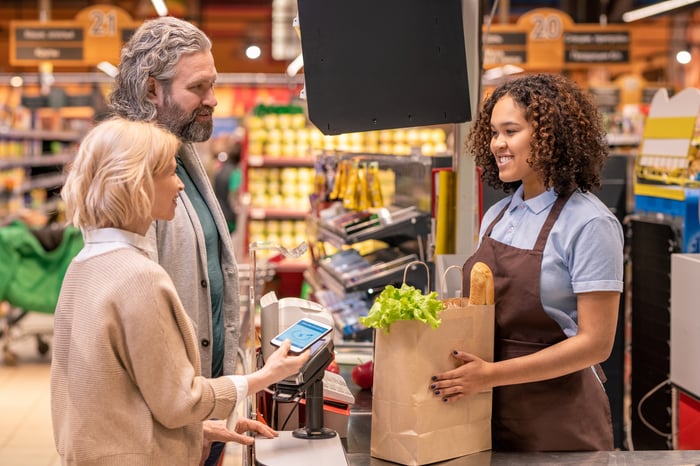Kroger is one of the largest U.S. companies by revenue, but it doesn't generate as much hype as competitors like Walmart and Target. Kroger stores are strictly supermarkets, unlike Walmart and Target, but it also owns a separate chain of jewelry shops.
As an essential business, Kroger provided Americans with food staples throughout the pandemic and sales soared. But the company's share price is only up 5% year to date, trading at a low eight times trailing-12-month earnings. Is it underpriced? And should you buy shares?
High sales, slow growth
Kroger owns 2,750 U.S. grocery stores and took in $122 billion in 2019 sales, compared with Target's close to 1,900 stores and $78 billion in 2019 sales.

Image source: Getty Images.
In the third quarter ended Nov. 7, comparable sales grew 11%, and digital increased 108%. Let's compare that with Walmart and Target over a similar period:
| Company | Comps Growth | Digital Growth |
|---|---|---|
| Kroger (KR -0.20%) | 11% | 108% |
| Walmart (WMT 0.09%) | 6% | 70% |
| Target (TGT 0.30%) | 20% | 155% |
Data sources: Kroger, Walmart, and Target quarterly results.
Kroger digital reached 98% of customers and offers options such as pickup and delivery in most stores. It's in the process of building two new distribution centers for cost-effective digital fulfillment, and it raised its full-year outlookto 14% comps growth.
So why don't investors have much confidence in the company? For one thing, growth is generally slow. Comps increased just 2% in 2019, and overall sales generally grew at a slow pace. Also, as a business that sells strictly groceries, it has fewer ways to expand.
Restocking and rebranding
Kroger launched a strategic plan called Restock Kroger in 2018 to redefine the customer experience and create loyalty. The plan is meant to deepen what the company calls its moats, or differentiated features that give it a leg up. According to the company, these are freshness and quality, owned brands, and the data it uses to make better decisions for the customer. It calls its seamless ecosystem, marrying physical and digital shopping, its "competitive moat of tomorrow."
Private label is turning out to be a strong growth driver. Kroger has launched several of its own brands that are popular among customers, including the Simple Truth plant-based meat brand, which competes with heavyweights like Beyond Meat. These brands outperformed during the pandemic, as in many supermarket chains, since customers stocked up on value. CEO Rodney McMullen said on the recent earnings call, "While many competitors offer private label products, Kroger's unique approach to our brands is a differentiator in a competitive mode."
Kroger also introduced 250 new products in the third quarter, the most ever, targeted based on customer insights. And its email open rate is 18% higher than the industry average.
These features don't seem incredibly compelling in the face of other supermarkets that offer similar products and services, which may contribute to lower investor confidence. But they are heralds of growth, and as the company continues to implement digital improvements, it is likely to see sales improve as well.
Kroger stock only gained 13% over the past three years, and it still hasn't returned to previous highs. But it pays a dividend that yields an above-average 2.2%, making it attractive to income investors.
Kroger is making the right moves to grow sales, and there's a good chance that the stock price will appreciate, but there's a reason that it trades so cheaply. Kroger is a healthy stock that would be a positive addition to a retirement portfolio and offers a strong and secure dividend. I wouldn't recommend it as a high-growth option to build fast wealth, but it's a value purchase to complement and diversify a range of holdings.




